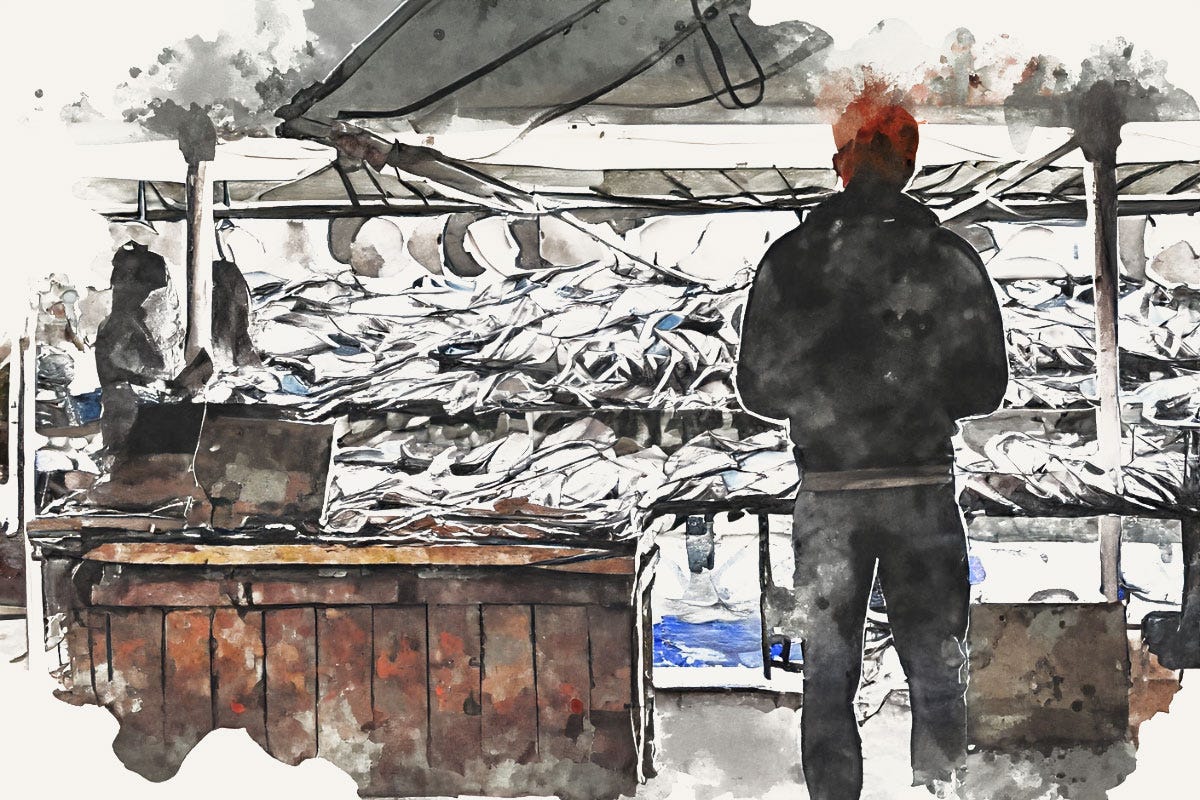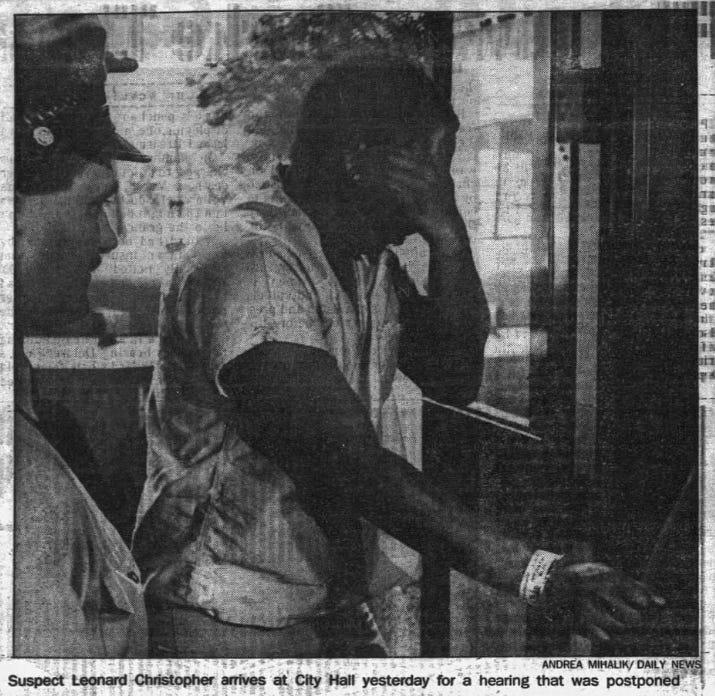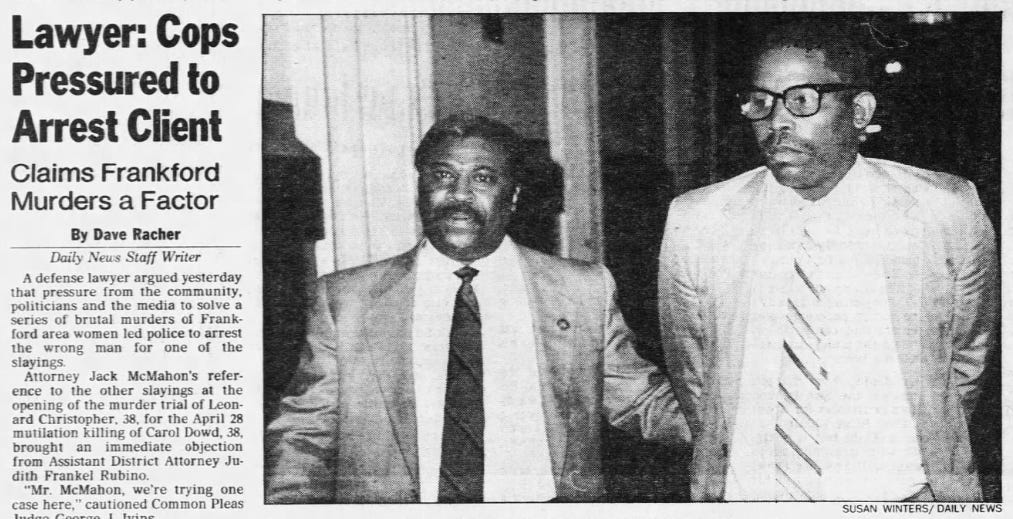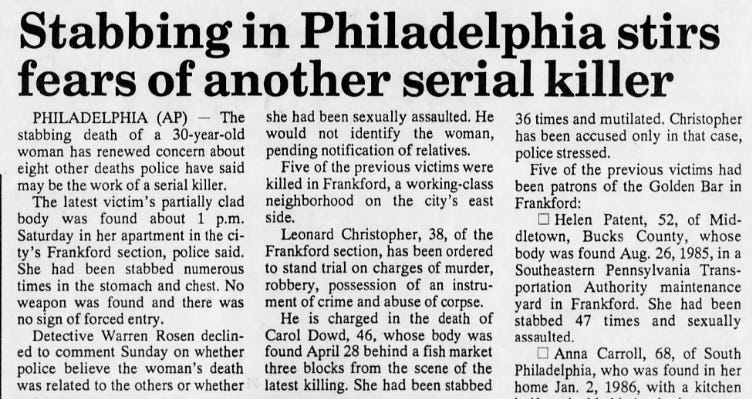The Seafood Market Murder
When a murdered woman is found behind a Philadelphia fish market, investigators suspect she may be the victim of a local serial killer.
The Seafood Market Murder
At 46 years old, Carol Dowd was battling many challenges in life. She lived in a halfway house in the Frankford neighborhood of Philadelphia and frequented local bars.
She was outgoing and quick to strike up a conversation with anyone: the cashier at the Little Spot, who sold her a six-pack of beer on the evening of April 28, 1990; the bartender at the Happy Tap, who poured her drinks that night; and a stranger she had just met that evening at the bar—an older, white man with gray hair.
At 2:00 a.m. on April 29, 1990, a patrolman, Officer Dean Johnson, making his rounds in Frankford stepped behind Newman’s Sea Food at 4511 Frankford Avenue. There had been reports of break-ins at area businesses, and he wanted to ensure everything was secure.
In the alley, behind the seafood shop, however, he came upon the nude body of Carol Dowd. She had been sexually assaulted, then viciously beaten about the head and face.
She had been stabbed in the face, back, neck, and chest. Her abdomen had been slit open, and her intestines spilled out. She had defensive wounds on her hands, and it was later determined that one of her nipples had been sliced off. The scene was bathed in blood.
Dowd had not been dead long. It was estimated that she was murdered sometime between midnight and 1:40 a.m., twenty minutes before her body was found. The clothes she had been wearing were found in the alley, not far from her body.
So was her purse. It had been opened, and some of the items inside had fallen out, but nothing was missing. From all appearances, robbery was not the motive for the murder. Rape was a more likely motive.
Carol Dowd’s home was not far from the alley, and she was well-known in the neighborhood. Early in the investigation of her murder, a witness reported seeing Dowd walking along the streets in the company of an older Caucasian man mere hours before she was killed. Other possible witnesses, however, pointed their fingers in another direction.
According to her brother, James Dowd, Carol Dowd’s childhood was relatively uneventful. Their older brother, Thomas, was killed in Vietnam in the late 1960s. That tragedy greatly impacted Carol. “She started to hear voices,” James explained. She was diagnosed with paranoid schizophrenia and admitted to the Philadelphia State Hospital.
Carol Dowd spent most of the 1970s in and out of various mental institutions getting treatment for her mental illness. She was starting to rebuild her life after being released from the hospital and enrolling in a community-based treatment program. As part of this program, she moved into her own apartment.
In this apartment, however, Dowd was raped—an event that retriggered her mental health decline.
At the time of her murder, James later explained, Carol was living in a halfway house in Frankford. He described his sister as “a very outgoing person. She would talk to anybody. Very friendly, very generous … a good personality”. She was finally moving beyond the trauma of her past when tragedy found her once again.
Leonard Christopher was a 38-year-old African American man who worked at Newman’s Sea Food as a fish cutter. Like Dowd, Christopher had a rough past.
Acquaintances stated that Christopher was once a “disheveled, down-on-his-luck bum whose belly protruded over his belt.” They added that he was a “moocher” who pestered them for beer and cigarettes. For a time, he was homeless and slept in an abandoned house.
Christopher’s luck took a turn for the better about nine months before Dowd’s murder. He was hired as a fish cutter at Newman’s Sea Food and was finally earning a stable income.
It was enough for him to afford his own apartment. He started working out, got fit, bathed regularly, and laundered his clothes. He even got a haircut and started shaving. He still bummed cigarettes off his friends at the bar, but everyone could see that he enjoyed his new job and was thriving.
When the police started questioning people in the area about Carol Dowd’s murder, they learned that she was seen that night in the company of an older white man. But then Leonard Christopher started throwing up some red flags.
To start, Christopher stopped into the nearby Rite-Aid pharmacy first thing in the morning on April 29. According to one of the cashiers—a woman named Colleen—it seemed like the only reason he came into the drugstore that morning was to tell everyone about the murder.
“The day it happened, he was in here telling everybody about it. How they found her. Like he was bragging. Everybody was asking him questions,” Colleen said.
Another witness claimed to have seen Christopher behind the seafood store holding a knife. Since he worked at the seafood store as a fish cutter, she didn’t think anything of it until she heard about Dowd’s murder.
Philadelphia police questioned Christopher. When they asked where he was at the time of the murder, he told them he was with his girlfriend.
The girlfriend, however, said she was alone that night. The officers who initially spoke to Christopher noted that he had no cuts or injuries. They did, however, spot a few drops of blood on his pants that raised suspicions.
Christopher’s employer, who was unnamed in news articles, was able to explain the blood. She claimed that Christopher was tasked with cleaning up the crime scene after the police left. “The mess was still there so my husband told him to clean up the blood. He brushed it clean,” she said. She surmised that a few drops of Dowd’s blood splattered on Christopher’s pants when he swept the alley.
The fish shop owner also said of Christopher, “He was a talker, talks a lot with the customers.” His talkativeness when police interrogated him also gave them a reason to suspect him.
He chatted with the Philadelphia police officers about the robberies in the area and the prostitution problem. When the conversation turned to murder, Christopher mentioned that he knew Margaret Vaughan, another recent murder victim from the Frankford neighborhood. That was the clincher.
On May 5, Leonard Christopher was arrested and arraigned on charges of murder, abuse of a corpse, possession of an instrument of a crime, and robbery. The judge ordered him to be held without bail.
With Christopher in jail, the police widened their investigation to see if evidence pointed to him as Margaret Vaughan’s killer. Or if he was linked to any other recent murders in the Frankford neighborhood.
There had been seven previous unsolved murders, and when Carol Dowd’s body was found, police immediately assumed the same killer had murdered all the women—that they had a serial killer in their midst.
Between 1985 and 1990, nine people were murdered in Philadelphia’s Frankford neighborhood. The similarities between all the crimes were notable. All the victims were women. All had been raped. And all had been stabbed multiple times.
Interestingly, witnesses in several of these cases reported seeing the victim with an older white man just before they were killed.
Despite the patterns, Philadelphia Police Commissioner Willie Williams told reporters at a press conference regarding Carol Dowd’s murder, “We’re not looking at it as a serial killer.”
Investigators failed to find a connection between Christopher and the other murder victims of the so-called Frankford Slasher. Interestingly, the last murder attributed to the Frankford Slasher—the killing of 30-year-old Michelle Dehner in September 1990—occurred while Christopher was in jail awaiting trial for Dowd’s murder.
The evidence against Leonard Christopher was circumstantial at best—there was no physical evidence tying him to the crime, nor a murder weapon—yet the prosecutors went forward with his trial. Christopher’s court-appointed lawyer, Jack McMahon, Jr., tried to have his bail reinstated, saying:
One of the reasons, obviously, that he’s been held without bail is that he’s suspected in these other killings. Unless he dug his way out of prison, and went down to Frankford, and dug his way back in, he’s not the person that police have tried to intimate he is.
At the trial, several witnesses spoke about Christopher’s character, stating that he had never been in trouble with the law before, that he was a hard worker, and that he was a kind person. The prosecution countered with crucial testimony from two women who claimed to have seen Christopher with Dowd before she was murdered.
On December 12, 1990, the jury found Leonard Christopher guilty of one count of first-degree murder. He was sentenced to life in prison.
A number of people in the Frankford neighborhood, residents of Philadelphia, and Christopher’s attorney were outraged when the verdict was read.
“This case stinks. It’s garbage,” McMahon told reporters. “The police made a mistake. Leonard Christopher has never been arrested in his life and was honorably discharged from the U.S. Navy.”
He was incensed that the jury believed the testimonies of two prostitutes he described as “junkies who have been arrested 35 times between them” over his client’s testimony.
However, Assistant District Attorney Judith Frankel Rubino stood by the conviction. “This was an intelligent jury, and they were able to determine that circumstantial evidence is good evidence,” she stated.
Even Carol Dowd’s brother, James Dowd, was of mixed emotions when he heard the verdict. “I thought I would feel better after the verdict was read,” he said. “But I don’t feel any better now.”
As Leonard Christopher was led from the courtroom, he shouted, “I’m being railroaded! The Northeast stalker is still out there killing people! I didn’t commit no crimes.”
Today, the eight other murders in the Frankford neighborhood remain unsolved and are lumped together as being attributed to the Frankford Slasher, a mysterious, unknown serial killer who was, perhaps, an older white man.
Throughout his incarceration, Leonard Christopher maintained his innocence and consistently proclaimed that he had nothing to do with the rape and stabbing death of Carol Dowd. He died in prison from cancer.
Explore More
Read: ‘Frankford Slasher' Case Still Haunts Philadelphia, Remains Unsolved, NBC10 Philadelphia
Listen: The Frankford Slasher prt. 1, The Shocking Details
Watch: The Frankford Slasher | Unsolved Serial Killer Crime Scenes Documentary, Ruin Road










